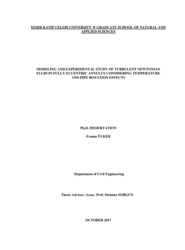Modeling and experimental study of turbulent newtonian fluid in fully eccentric annulus considering temperature and pipe rotation effects
- Tez Danışmanı Mehmet SORGUN
-
Tür
Doktora Tezi
- Yayın Tarihi 2018
-
Yayıncı
İzmir Katip Çelebi Üniversitesi Fen Bilimleri Enstitüsü
- Tek Biçim Adres Http://hdl.handle.net/11469/360
-
Konu Başlıkları
Frictional pressure loss
Inner pipe rotation
Temperature
Correlation
Mechanistic model
In this work, the effect of temperature on the pressure loss of Newtonian fluid in a fully eccentric annulus with pipe rotation is investigated. For this purpose, initially comprehensive experimental study has been conducted at Izmir Katip Celebi University (IKCU), Fluid Mechanics and Hydraulics Laboratory of Civil Engineering Department. Effect of temperature has been observed for flow velocities from 0.7 m/s to 3.4 m/s, for pipe rotations from 0 rpm to 120 rpm, and for temperatures is from 20 °C to 65 °C. The pressure loss within the test section is recorded. An increase in the liquid temperature results in a decrease in pressure gradient. On the other hand, the influence of temperature on pressure gradient becomes more significant, as the Reynolds number is raised. Variation of Taylor number causes negligible changes on frictional pressure losses for all temperature conditions considered. By using regression analysis of the dataset obtained from the experimental work, a simple empirical frictional pressure losses correlation taking into account of temperature effect is proposed. The proposed correlation could estimate the frictional pressure gradient within an error range of ± 5%.
Numerical methods frequently are used to solve turbulent flow problems due to the trouble in solving Navier-Stokes equations. Navier-Stokes equations including inner pipe rotation and temperature effects are solved via two different numerical techniques. Firstly, a developed numerical method presents the discretization of the equation with finite difference method and solved iteratively by fixing the nonlinear terms. Secondly, Newton-Raphson method is used to linearize the equation and then solve iteratively. The efficiency of the proposed scheme is compared with the
xiv
obtained solutions of the Newton-Raphson method. The proposed numerical method is computationally expensive, however, it may allow tackling the non-linearity of challenging problems in hydraulics. Moreover, a mechanistic model including proposed numerical method is developed in order to determine frictional pressure gradient for fully developed turbulent flow through fully eccentric horizontal annulus including pipe rotation and temperature. The computational frameworks are developed in MATLAB. A mathematical model is confirmed by the experimental study. Results show that computational fluid model is capable of estimating frictional pressure gradient with an error of less than 16.2%.
-
Koleksiyonlar
ENSTİTÜLER
FEN BİLİMLERİ ENSTİTÜSÜ

 Tam Metin
Tam Metin

